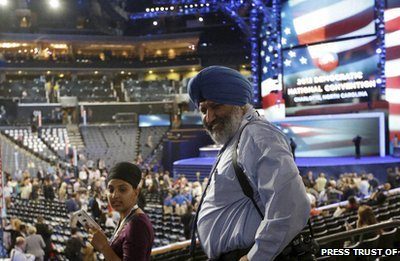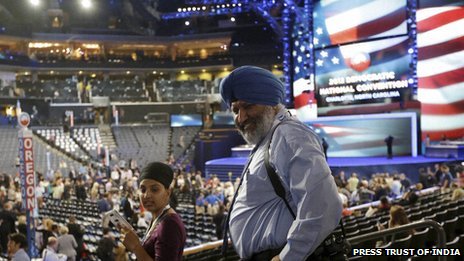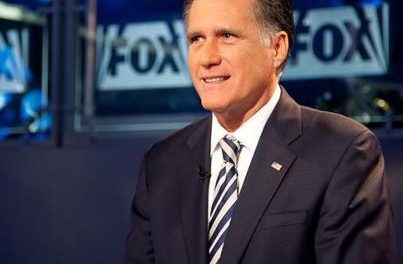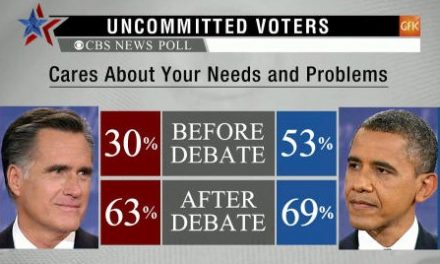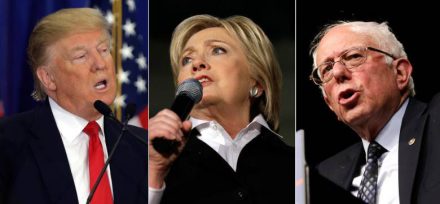By: BBC Asia
As the US gets ready for elections later this year, Washington-based journalist Seema Sirohi explores why many Indian-Americans support the Democratic Party.
A young Indian-American recounted recently that his mother, who is working hard on President Barack Obama’s re-election campaign in the tough swing state of Florida, had told him flatly not to come home if he decided to vote for Mitt Romney, the Republican rival.
He laughed but said his mother was not exactly joking when she issued the warning.
He is still undecided but is leaning towards Mr Obama for a variety of reasons – ranging from empathy for the immigrants to policy decisions the president has made in favour of the middle class and students.
As the US presidential election enters its final lap, the Indian-American vote could be crucial in swing states such as Virginia, and Mr Obama may benefit from the community’s strong support for the Democratic Party.
An impressive 84% of the 2.85 million-strong Indian-American community voted for Mr Obama in 2008, second perhaps only to African-Americans as a minority group.
Has he still got their love? It appears so.
According to a Pew Research Center survey released in June, 65% of Indian-Americans approve of the way Mr Obama is handling the presidency.
Of all the Asian American groups surveyed, Indian-Americans were the most Democratic-leaning, again at 65%. Only 18% favoured Republicans.
‘No chai’
Interestingly, the support for the Democrats is stronger among the younger generation, a group where one might expect the mantras of the Republican Party – about success, getting ahead, Wall Street is Main Street and deregulation – might work the most.
Instead, the young seem more enamoured of the fairness doctrine and an activist government.
This is much to the chagrin of the Republican Party whose Indian-American supporters – fewer in number – are puzzled, frustrated and even irked by the fierce loyalty to their opposite number.
“Why doesn’t the community just follow them into the ‘large’ [but mainly white] tent of the Republican Party?” they ask plaintively.
The short answer: “They are not serving chai at this “Tea Party” convention”, laughs Toby Chaudhuri, a long-time Indian-American political strategist associated with several campaigns, including Al Gore’s presidential bid.
Chai may be a staple at Starbucks, but it has not quite made it on to the Republican menu.
In other words, the inclusiveness is lacking in a party increasingly seen as hostage to Tea Party enthusiasts and Christian conservatives.
And the attempt to include minorities is seen by the Indian community as tokenism.
The Republican Party fielded two Indian-American governors – Bobby Jindal of Louisiana and Nikki Haley of South Carolina – at the convention. Mr Jindal could not make it because of hurricane Isaac which hit his state hard.
Both Mr Jindal and Ms Haley are stars in their own right, but both have shied away from their ethnic roots to gain acceptance.
They converted to Christianity from Hinduism and Sikhism, a move that many in the older generation frowned upon. Whether they did it for personal or political reasons is unclear.
The decision on conversion did not endear them to the community, which is largely Hindu, but only reinforced the feeling that the “family values” of the Republican Party are essentially Christian values.
Abortion and gay marriage – two hot button issues that propel conservative Christians – do not arouse much passion among Indian-Americans.
Throwing peanuts
Besides, for every Jindal and Haley who has been accepted, there is a George Allen, a former senator from Virginia, whose openly racist remark against an Indian-American aide in 2006 still reverberates.
Mr Allen, who called SR Sidarth, a volunteer for the Democratic Party, a “macaca” (monkey), is once again running for the US Senate on a Republican ticket.
The collective memory was rekindled last week, when Indian-Americans read about an African-American camerawoman for CNN, who had peanuts thrown at her at the Republican convention by a delegate along with the remark “this is how we feed animals”.
Party spokesmen immediately denounced the comment and ejected two men from the hall but the incident underscored for many that the Republican Party remains the domain of white men.
Indian-Americans have their own history of discrimination in the United States, especially the early immigrants who arrived at the turn of the 20th Century mainly as farm labour.
The second major wave in the late 1960s brought skilled professionals, who laid the foundation for the economic and academic success of the community.
Today 70% of Indian-Americans have a college degree or more, and two-thirds have management jobs.
They have the highest median household income at $88,000 (£55,500) – the national average is $49,800 (£31,400).
Again success and riches should drive them to the Republican fold but they aren’t going, at least, not yet.
The well-educated community has a certain political sophistication, a generous bent, which embraces a world view with more than 50 shades of grey.
It allows empathy for the less fortunate.
‘Kitchen table issues‘
Over the past two decades, Indian-Americans have seen the US go from the prosperity of budget surplus to the poverty of recession, and launch of an unnecessary war.
And it is not easy to forget that former President George Bush launched those wars, and deregulation began in earnest in his era.
Besides, Indian-Americans who grew up in India do not see government as an evil monster but a necessary arbiter between order and chaos.
They want the government to perform and perform well, and shrink only within reason.
Most Indian-Americans are middle class and they see President Obama addressing some of the issues close to their hearts – reducing the burden of spiralling costs of college education, passing a health care act that moves the country towards making health care a right rather than a privilege, and trying to save social security.
They like the social safety nets here for their ageing parents who may have joined them for their retirement years.
“The Democrats have been addressing the kitchen table issues important to the community,” says Toby Chaudhuri.
Meanwhile Republican proposals do not appear to have convinced even some of the richest Indian-Americans.

